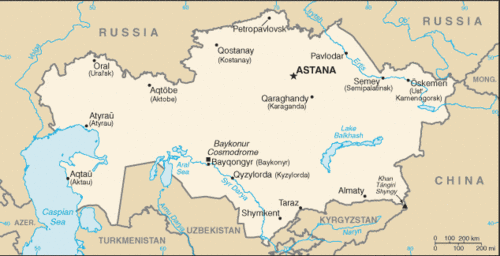Welcome to the Virtual Education Wiki ~ Open Education Wiki
Kazakhstan
by Paul Bacsich for Re.ViCa
For entities in Kazakhstan see Category:Kazakhstan
Partners situated in Kazakhstan
None.
Kazakhstan in a nutshell
(sourced from http://en.wikipedia.org/wiki/Kazakhstan)
Kazakhstan (Kazakh: Қазақстан - Qazaqstan; Russian: Казахстан), officially the Republic of Kazakhstan, is a country situated in Central Asia and, according to the Council of Europe, Eastern Europe.

Ranked as the ninth largest country in the world as well as the world's largest landlocked country, it has a territory of 2,727,300 km² (greater than Western Europe). It is neighbored clockwise from the north by Russia, China, Kyrgyzstan, Uzbekistan, Turkmenistan, and also borders on a significant part of the Caspian Sea.
With 16.4 million people (2009 census), Kazakhstan has the 62nd largest population in the world, with a population density of less than 6 people per square kilometre (15 per sq. mi.).
The capital moved in 1997 to Astana from Almaty, Kazakhstan's largest city.
Vast in size, the land in Kazakhstan is very diverse in types of terrain: flatlands, steppes, taigas, rock-canyons, hills, deltas, in part snow-capped mountains and deserts.
Kazakhstan declared itself an independent country on December 16, 1991, the last Soviet republic to do so. Since independence, Kazakhstan has pursued a balanced foreign policy and worked to develop its economy, especially its hydrocarbon industry.
Kazakhstan is ethnically and culturally diverse, in part due to mass deportations of many ethnic groups to the country during Stalin's rule. Kazakhs are the largest group.
Kazakhstan allows freedom of religion, and many different beliefs are represented in the country. Islam is the primary religion.
The Kazakh language is the state language, while Russian is also officially used as an "equal" language (to Kazakh) in Kazakhstan's institutions.
Kazakhstan is divided into 14 provinces (облыстар, oblıstar). The provinces are subdivided into districts (аудандар, awdandar). Almaty and Astana cities have the status of State importance and do not relate to any province. Baikonur city has a special status because it is currently being leased to Russia with Baikonur cosmodrome until 2050.
Kazakhstan education policy
(sourced from http://en.wikipedia.org/wiki/Kazakhstan)
Education is universal and mandatory through to the secondary level and the adult literacy rate is 99.5%.
Schools in Kazakhstan
Education consists of three main educational phases: primary education (forms 1–4), basic general education (forms 5–9) and senior level education (forms 10–11 or 12) divided into continued general education and professional education. (Primary education is preceded by one year of pre-school education.)
These three levels of education can be followed in one institution or in different ones (e.g. primary school, then secondary school). Recently, several secondary schools, specialized schools, magnet schools, gymnasiums, lyceums, linguistic and technical gymnasiums, have been founded. Secondary professional education is offered in special professional or technical schools, lyceums or colleges and vocational schools.
Higher education
Universities in Kazakhstan
At present, there are universities, academies, and institutes, conservatories, higher schools and higher colleges. There are three main levels: basic higher education that provides the fundamentals of the chosen field of study and leads to the award of the Bachelor's degree; specialized higher education after which students are awarded the Specialist's Diploma; and scientific-pedagogical higher education which leads to the Master's Degree. Postgraduate education leads to the Kandidat nauk (Candidate of Sciences) and the Doctor of Sciences. With the adoption of the Laws on Education and on Higher Education, a private sector has been established and several private institutions have been licensed.
The Ministry of Education of Kazakhstan runs a highly successful Bolashak scholarship, which is annually awarded to approximately 3000 applicants. The scholarship funds their education in institutions abroad, including Oxford and Ivy League universities. The terms of the program include mandatory return to Kazakhstan for at least five years of employment.
For a complete list of universities see http://en.wikipedia.org/wiki/List_of_universities_in_Kazakhstan
Polytechnics in Kazakhstan
Higher education reform
The Bologna Process
Administration and finance
Quality assurance
Information society
Towards the information society
Information society strategy
ICT in education initiatives
Interesting Virtual Campus Initiatives
Interesting Programmes
The Almaty Technological University supports distance education.